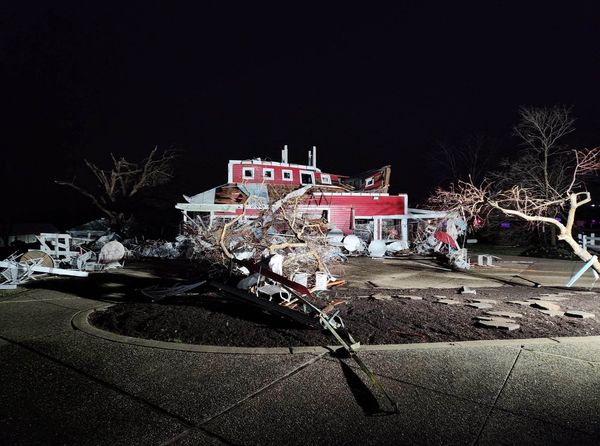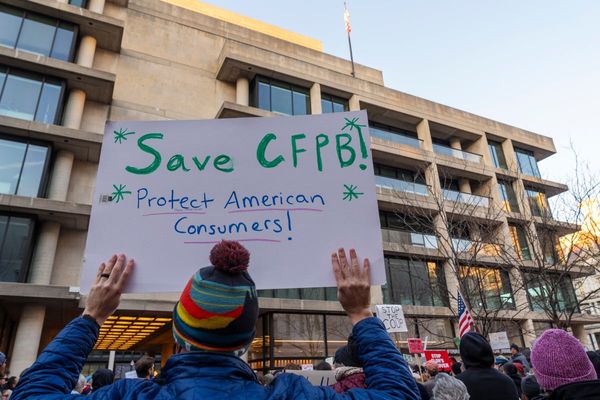
Peter Dutton has accused Anthony Albanese of being “very tricky” for dead-batting questions about whether Labor might legislate the Indigenous voice to parliament in the event the referendum to constitutionally entrench it fails.
The prime minister told Sky News on Tuesday evening and 2GB Radio on Wednesday that he is doing what First Nations people have requested, is “optimistic” the referendum will succeed and is not countenancing what the government would do in the event of a loss.
The opposition leader told reporters in Brisbane that if the referendum is defeated “the prime minister can legislate in the parliament in a heartbeat” with its lower house majority and Senate support.
“Is he saying to the Australian public if you vote no in the referendum that he will legislate the next day to bring it in?
“If that’s the case, well, pass the legislation now and demonstrate to Australians how it can work.”
Dutton said that voters will be asked “one question” in the referendum not “two separate questions” about constitutional recognition and the voice.
He accused Labor of “trying to give moral cover to the voice through constitutional recognition”, labelling that a “cheap political trick”. “And frankly it’s pretty tacky from the prime minister to try and conflate the two issues and to try and trick and deceive the Australian public.”
The Albanese government has said it will have a referendum in the second half of 2023 to enshrine the voice in the constitution, as requested by Indigenous Australians in the Uluru Statement from the Heart.
Labor is seeking support from Dutton who started 2023 by continuing to ask questions for more detail about the voice, many of which the attorney general, Mark Dreyfus, says he already knows the answers to.
Dutton has also suggested legislating the voice before the referendum, which Albanese ruled out, and called for release of a draft bill at least, which experts advising the government warned risks confusing voters.
On Tuesday conservative broadcaster Chris Kenny, who was a member of the co-design group advising the former Coalition government on the voice, asked Albanese if he would legislate the voice anyway if the yes campaign in the referendum were to fail.
“I will follow what Indigenous people said,” Albanese replied. “This is a process that began in 2012, there were five years of consultation leading up to in 2017 Aboriginal and Torres Strait Islander people meeting at Uluru and coming up with the statement, that they wanted to take forward the statement of reconciliation.
“I’m not contemplating failure here. What I’m doing is being as optimistic as the Australian people are themselves.”
Albanese said the former Coalition government were in power for “a very long time” and “could have” legislated the voice “at any stage”.
“What I’m doing now is what has been requested by Aboriginal and Torres Strait Islander people and [for] which there is a very broad range organisations [in support].”
Albanese cited the support of church groups; sporting bodies including the AFL, NRL, basketball association and Tennis Australia; and business groups including the Business Council and Minerals Council.
“I want this to be a movement that unites Australians in a positive way just as in 1967 [Australia] united to make sure … discriminatory issues … in the constitution were removed.
“This is a chance for something positive to happen, to recognise Aboriginal and Torres Strait Islander peoples in our nation’s birth certificate. And I’m confident that Australians will take up that opportunity.”
Albanese was asked again on 2GB Radio on Wednesday by broadcaster Ben Fordham, who warned if he didn’t say whether he would legislate the voice after an unsuccessful referendum then “people will be wondering ‘why are we going to the ballot box anyway?’”.
“Well, one of the things that I’m not doing is leading with a position that assumes a loss of a referendum,” Albanese replied.
“That would not be a very sensible thing to do. And I am determined to do what I can, along with so many other Australians who will be campaigning for a ‘yes’ vote from across the political spectrum. And that is my focus.”
Asked if Australians’ votes at the referendum will “count”, Albanese said: “It does count. The whole point of a referendum is that you change the constitution.”
He said the referendum would both recognise First Nations people in the constitution and set up a “consultative body … that enables Aboriginal and Torres Strait Islander people to be asked about policies that will directly impact them so that we can close the gap in education, in health, in all of those issues”.
Albanese rejected the suggestion that entrenchment of the voice would result in litigation if the parliament did not follow its advice as “not right”, citing advice and public statements by former high court justice Robert French.
Albanese confirmed that “there will be an office” for the voice and said there was “no suggestion” its members would be paid, but didn’t rule it out.







